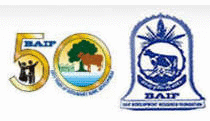Rajasthan is one of the Indian States, which is blessed by recurrent droughts. The drought of 2002 has affected all 32 districts with an average rainfall deficit of about 52% . The water table is going down at a rapid pace causing wells and hand pumps to go dry. People have little money and little to eat. Migration to cities and other states has become common, completely disrupting the social structure in villages. In the tribal dominated area result is deforestation and environmental degradation by habitant for survival and food security.
In this bleak scenario BAIF Development Research Foundation, Pune has been implementing successful and sustainable rural poverty alleviation programmes in the drought prone areas of Rajasthan state over the last two decades. One such example is the EU-funded "Transfer of Technologies for Sustainable Development" (Project No.ALA/94/32; BAIF-EU). The "Jana Utthan" approach evolved by the project, has demonstrated sustainable rural poverty alleviation in around 40 villages, covering 6000 poor tribal families in Udaipur and Banswara district. This same project is operational in 11 districts of 5 states of India and is covering over 34000 poor rural families of which more than 65% are tribal, schedule cast and other backward cast. The project duration is 9 years i.e. April 1996 to December 2004.
The project was recently visited and commended by a team of EU member - Country Development Counselors and also by Tribal Commissioner and Collector Udaipur and numerous senior Rajasthan government officials. On the basis of the work done in this project, BAIF has been attempting to influence national development policy through interactions with Planning Commission of India and other policy makers at National and State level.
Another example is the ICEF (India-Canada Environment Facility) funded community based watershed development programme. The project ran for 6½ years and was successfully completed in March 2003. This project included components like watershed development, silvipasture development and cattle development etc. Impacts of the project include empowerment of the village community, increase in ground water levels and year round water availability increased agriculture + livestock production and productivity and increased vegetation cover and bio-mass availability.
The project was visited on 6 April 2004 by Chief Secretary and Secretary, Agriculture and Animal Husbandry, Govt. of Rajasthan and appreciated the type of interventions leading to poverty alleviation and people participation.
The project concept incorporates the integrated "Jana Utthan" approach, which will ensure environmental conservation through drought proofing and a sustainable livelihood for the Saheriya Tribe in the selected project area. A focus from the very beginning, on the promotion of people's organizations, on improving community health on equity issues including gender and on raising community awareness about ill effects of existing social customs through education and training, is intended to ensure the sustainability of the development process. People's organization's linkages with Panchayat Raj Institutions will ensure progress towards good governance and true empowerment of Saheriya, a primitive Tribal Community. |




